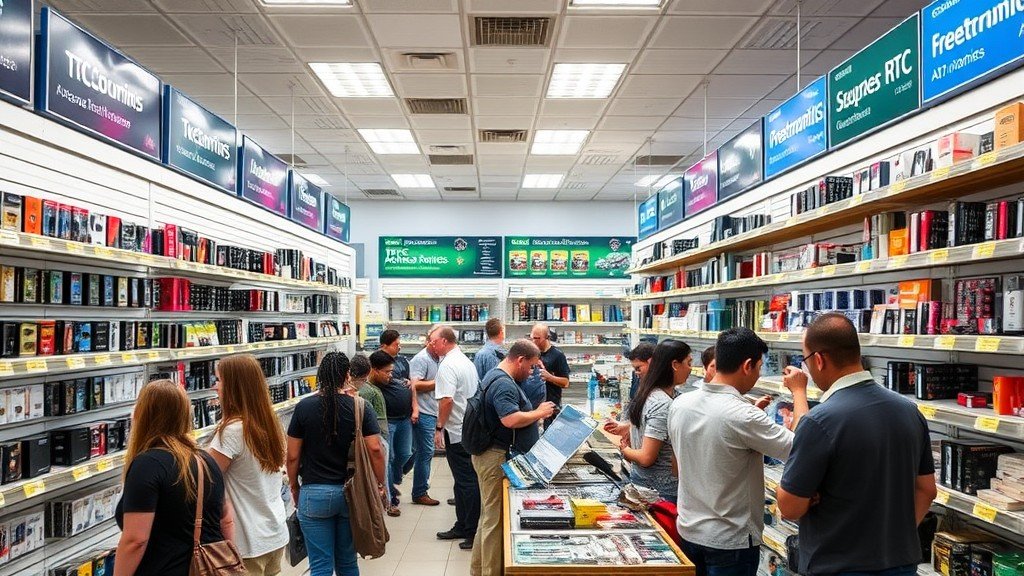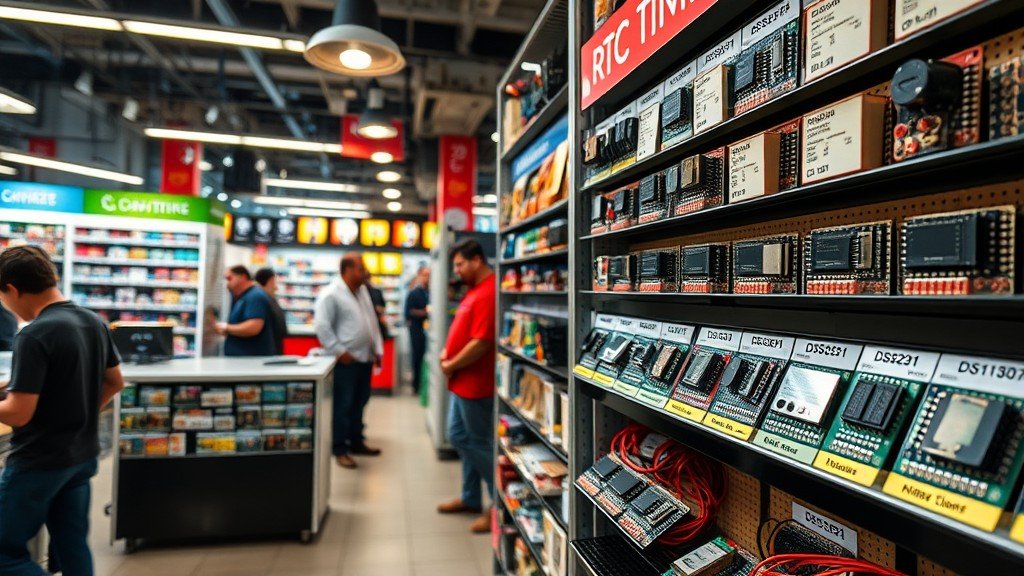Finding the right RTC modules is crucial for projects that require accurate timekeeping, whether for data logging or embedded systems. Popular RTC chips like the DS3231 and DS1307 provide precise time and low power consumption.
This article highlights the best places to buy these modules, ensuring you get exactly what you need for your next project. Want to learn more about where to find reliable RTC modules? Keep reading for helpful information!
Key Takeaway
- RTC modules are essential for accurate timekeeping in various applications.
- Online retailers like Robu.in and Botland.store offer a wide range of RTC modules at competitive prices.
- Local electronics stores like Jaycar and Altronics provide hands-on shopping experiences for RTC module enthusiasts.
Online Retailers
Credits: JD Electronics
- Robu.in
- Robu.in offers a diverse selection of RTC modules, including popular options like the DS3231, DS1307, and DS1302.
- Prices start at ₹69 for basic modules, while advanced options like the DS3231, which features temperature compensation and an I2C interface, are available for up to ₹145.
- Detailed specifications are provided for each module, including power requirements and operating temperatures, making it easy to select the right fit for your project.
- Probots.co.in
- Probots.co.in positions itself as one of India’s largest distributors of electronic components, including a wide range of RTC modules.
- They emphasize fast delivery and a broad selection of products, making it a convenient choice for both engineers and hobbyists seeking reliable components.(1)
- Botland.store
- Botland.store features a variety of RTC modules, such as the Grove DS1307 and Adafruit DS3231.
- The store frequently offers promotions on several models, catering to both beginners and advanced users.
- Compatibility with popular platforms like Arduino and Raspberry Pi is highlighted, facilitating easy integration of these modules into existing projects.
Local Electronics Stores

- Jaycar Electronics (Australia)
- Jaycar is well-regarded for its extensive selection of electronic components, including a variety of RTC modules.
- They offer products such as Freetronics RTC modules, which are specifically designed for ease of use with Arduino projects, making them accessible for both beginners and experienced users.
- Altronics (Australia)
- Altronics also provides a diverse range of RTC modules suitable for various projects.
- Similar to Jaycar, they emphasize user-friendly components that integrate seamlessly with Arduino setups, ensuring a smooth experience for developers.
These retailers present a wealth of options for RTC modules, whether shopping online or visiting local electronics stores, making it easy to find the right components for your projects.
Marketplace Options
- eBay
- eBay serves as a popular platform for acquiring low-cost RTC modules, with prices typically ranging from $0.99 to $1.50 USD.
- Users have reported satisfactory performance from budget options like the DS3231. However, it’s important to note that these economical modules may lack temperature compensation, which can impact accuracy in extreme conditions.
- Amazon
- Although not specifically highlighted in the search results, Amazon generally offers a wide selection of electronic components, including RTC modules from various brands.
- Shoppers can find a range of options, making it easy to compare features and prices to find the right module for their needs.
These marketplace options provide convenient avenues for sourcing RTC modules, catering to different budgets and project requirements.(2)
Recommendations
- For high accuracy and reliability, consider purchasing modules based on the DS3231 chip. These modules are well-regarded for their performance across various conditions, making them an excellent choice for applications that require precise timekeeping.
- If you are seeking budget-friendly options, eBay can be a viable choice. However, it’s important to be cautious about the specifications to ensure that the modules meet your project requirements and maintain acceptable performance levels.
These recommendations provide effective ways to find RTC modules that align with your budget and project needs, ensuring you select the right components for your electronic designs.
Conclusion
Identifying the right RTC module supplier is crucial for projects that require precise timekeeping. Whether through online retailers like Robu.in and Botland.store or local stores such as Jaycar and Altronics, a wide array of options is available. By considering factors such as accuracy, power consumption, and compatibility, you can select the best RTC module to meet your specific needs and ensure the success of your project.
FAQ
What are the benefits of using an RTC module with an I2C bus for accurate timekeeping?
Using an RTC module with an I2C bus allows for precise timekeeping in embedded systems, making it ideal for applications like data logging and real-time clocks. The I2C interface simplifies connections, requiring only two wires, which is efficient for low power consumption. Modules like the DS3231 RTC and DS1307 RTC are popular choices due to their high accuracy and ability to manage leap years, ensuring that your clock remains accurate over long periods, even during power loss situations.
How does the DS3231 RTC compare to the DS1307 RTC in terms of power consumption and accuracy?
The DS3231 RTC is known for its ultra-low power consumption and high accuracy compared to the DS1307 RTC. While both modules provide real-time clock functionality, the DS3231 offers better performance in low current scenarios, making it suitable for battery-powered applications. It also features a temperature sensor and can maintain precise timekeeping with minimal power loss. In contrast, the DS1307 RTC is a reliable choice but may not match the DS3231’s performance in high precision or low power management.
Can I use an RTC module with a Raspberry Pi for my projects?
Yes, you can use an RTC module with a Raspberry Pi to enhance timekeeping capabilities in your projects. Modules like the DS3231 RTC or DS1307 I2C can easily connect via the I2C interface, allowing the Raspberry Pi to read the time accurately. This setup is particularly useful for projects requiring consistent timekeeping during power outages or when the main power supply is interrupted. Additionally, these modules support battery backup options, ensuring that your clock continues to function even without external power.
What should I consider when choosing an RTC module for my Arduino projects?
When selecting an RTC module for Arduino projects, consider factors like power consumption, accuracy, and ease of integration. Look for modules that offer low power operation and features such as battery backup to maintain time during power loss. The DS3231 RTC is a great option due to its high precision and low current draw. Additionally, check if the module supports I2C communication for simple wiring and compatibility with various Arduino boards. Features like temperature compensation and leap year handling can also enhance performance in your applications.
How do I set up a real-time clock using an RTC breakout board?
Setting up a real-time clock using an RTC breakout board involves connecting the module to your microcontroller via I2C. Start by wiring the SDA and SCL pins from the RTC module to corresponding pins on your Arduino or Raspberry Pi. Next, ensure you have a suitable power source; many modules operate on battery power or main supply. After connecting, use libraries specific to your RTC chip (like DS3231 or DS1307) to programmatically read the time and manage settings like alarms or square wave outputs for synchronization purposes.
What features should I look for in an RTC module for data logging applications?
When choosing an RTC module for data logging applications, consider features like high accuracy and low power consumption. Modules such as the DS3231 RTC are excellent for maintaining precise time over long periods, which is crucial for accurate data collection. Look for options that provide battery backup to ensure timekeeping during power loss. Additionally, features like a square wave output can be useful for triggering events in your data logging system, while compatibility with various microcontrollers, including Arduino and Raspberry Pi, enhances versatility.
How does an RTC module handle leap years and maintain accurate time?
An RTC module manages leap years by incorporating algorithms that account for the extra day in February every four years. This feature is essential for maintaining accurate time over long periods. Modules like the DS1307 RTC and DS3231 RTC are designed to automatically adjust for leap years, ensuring that your clock remains precise without manual intervention. By using a reliable RTC chip with this capability, you can ensure that your real-time clock functions correctly throughout the year, providing exact timekeeping even in embedded systems.
Why is battery backup important for RTC modules in embedded systems?
Battery backup is crucial for RTC modules in embedded systems because it ensures continuous timekeeping even during power loss. Many RTC modules, like the DS1302 RTC and DS1307 I2C, come with a battery holder that allows a CR2032 battery to maintain the clock’s function when the main power source is interrupted. This feature is especially important for applications requiring accurate time tracking over extended periods, such as data logging or real-time clocks in devices that may not always be powered on.
How can I integrate temperature sensors with my RTC module for enhanced functionality?
Integrating temperature sensors with your RTC module can enhance functionality by enabling you to log both time and temperature data simultaneously. Many RTC modules, such as the DS3231 RTC, include built-in temperature sensors that provide real-time temperature readings alongside accurate timekeeping. To set this up, connect the temperature sensor to your microcontroller and use libraries compatible with both the RTC chip and the sensor. This combination can be particularly useful in applications like environmental monitoring or climate control systems where both time and temperature data are critical.
References
- https://www.jameco.com/Jameco/choosing-the-right-real-time-clock-chip-or-module
- https://hackaday.com/2020/09/30/choosing-the-right-rtc-for-your-project/


